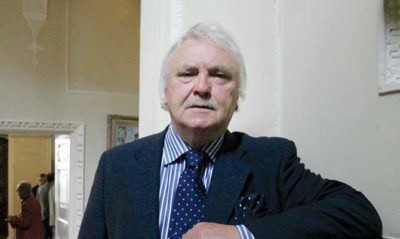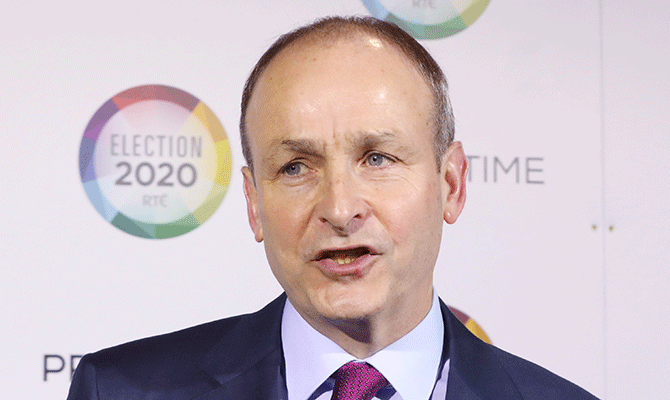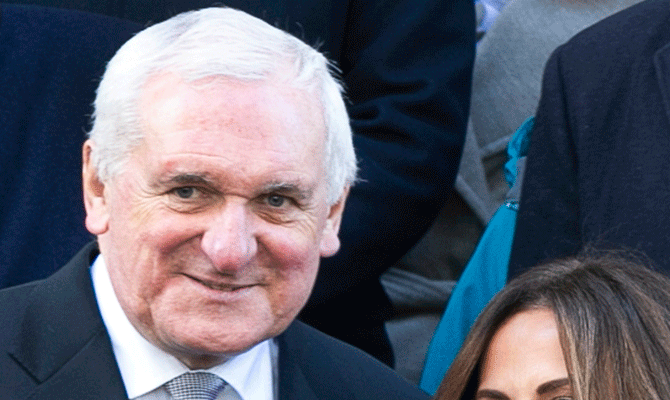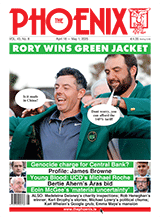
Eoghan Harris
SUNDAY INDEPENDENT columnist Eoghan Harris, the ultimate Republican apostate, is given to bombastic claims about his political savvy, from his political predictions to his alleged influence with leading politicians.
Read this profile first published in February last year asking if Harris would claim credit for Fianna Fáil’s and, in particular, Micheál Martin’s disastrous general election result?
Martin may or may not end up as a part-time taoiseach, but his leadership is under serious threat, while Sinn Féin is likely heading for an opposition platform that could see it eclipsing FF in short order. Harris can certainly claim to have played a major role in this fiasco, religiously delivering weekly support in the Sindo while also dispensing advice to Martin behind the scenes.
Sindo readers must be a little weary of the weekly Harris theatre, which depicts Martin as a cross between John F Kennedy and Charles Stewart Parnell, while SF leaders are presented as Ireland’s answer to ISIS, only more cunning, ruthless and unscrupulous. The lionisation of Martin sometimes veers towards caricature, with constant references to his salt-of-the-earth background, while his moral steadfastness is compared to those of lesser moral fibre who wilt in the face of fashionable opinion. Harris even praised Martin as “attractive to women and physically fit” in one particularly embarrassing piece (see The Phoenix 6/10/17).
PAEANS OF PRAISE
This Homeric story line is supplemented with a conspiratorial sub-plot, whereby RTÉ and most journalists are in awe of Mary Lou and SF; Section 31 in reverse. In turn, the “invincible ignorance” of young people about northern politics is a direct result of journalists’ infatuation with SF, a portrayal of the media coverage of SF that few outside the Dublin 2 bubble would recognise.
However, the Harris paeans of praise for Martin and the monstering of villainous SF leaders are perhaps moderated slightly by Sindo sub-editors as they are relatively prosaic compared to the near-hysterical interview Harris gave to Newstalk’s Ivan Yates recently. Nicely timed, within hours of the broadcast moratorium on election coverage, Ivan offered pat-a-cake questions to Eoghan about Martin, FF, the SF surge etc, with Eoghan rising like a seal to fish food.
Harris got straight to it with an attack on “snowflake” journalists that “can empathise with Auschwitz but they can’t empathise with the suffering of northern Protestants”. Irish journalists, he said, were similar to those in the 1930s who admired Hitler’s autobahns and how he got the trains running on time. As an aside, Harris added, by the way, “a lot of Jews in those trains” (some of these remarks would provoke outrage if they came from a member of British Labour or SF).
By way of light relief, or humour, Harris moved on to Martin, saying, the one good thing about FF was that they had him as leader. Martin must be unique among Irish politicians if Harris is correct in saying, “I don’t think Micheál Martin is actually capable of looking a person in the eye and lying” (sounds more like George Washington than JFK). Eoghan also corrected the outrageous slur against FF’s supposedly mediocre front bench, expressing his joy at the broadcast performances of Michael McGrath and Jim O’Callaghan, who had apparently demolished SF opponents in campaign debates (something that few people had noticed).
He went on to describe SF as fascist and “the Hitler party of this country”, which would plunge us into civil war with “ethnic cleansing… ethnic strife… and voodoo economics”. And that’s just for starters.
He denied Yates’s contention that FF and Fine Gael were essentially the same as, he claimed, FG was “selfish” and defended the people “who already have it”, (unlike the unselfish Soldiers of Destiny). Alternatively, Martin would lead a Rainbow coalition along with Labour’s Brendan Howlin, the Greens and others in a crusade for real social change.
When Yates plucked up the courage to suggest FF and SF might go into coalition government together, Harris ridiculed the very idea; “not a chance”, he said, explaining that it was a “moral question” for Micheál.
SULPHUROUS ATTACKS

Micheál Martin
Despite the diabolical forces at play, Eoghan concluded that, come the election, “Irish people’s common sense will kick in” and Martin would lead a coalition that would avoid civil war and deliver on housing and health. This reinforced his Sindo view expressed days earlier that, in the general election, the “silent moral majority” would support Martin’s view of SF as not a normal political party and that the FF leader was the only politician who could be trusted not to bring SF into government.
Quite apart from the entertainment value of these perorations in the Yates interview, there are a number of contradictions between Harris’s predictions and what actually transpired in the following 24 hours or so.
The day after the election – in which “common sense” appeared to be at a premium – an angry Harris column railed against various journalists for being, like RTÉ generally, “soft on [the ‘proto-fascist’] SF” and he suggested that Fintan O’Toole should return his Orwell Prize. The column’s main thrust, though, was a defence of the (good) media’s highlighting of the Paul Quinn controversy; a tactic that Harris seemed to recognise had not had the desired effect. If anything, it had rebounded as many people saw this relentless media campaign as politically opportunist.
The Sunday after the election results saw further sulphurous attacks on poor Fintan (quite unused to being criticised for an alleged weakness for Republicanism), with David McWilliams also coming in for it along with those that allegedly reflected the SF “euphoria” in RTÉ.
FG’s Varadkar and Simon Coveney were also lambasted for helping to create the SF surge, but this scattergun tirade reflected the post-election trauma inflicted on Martin and Harris by the election results.
Worse, however, Harris also had to contend with what looked like treason given that his chief, Martin – “the only politician who can be trusted not to take Sinn Féin into the bosom of the state” – appeared intent on doing just that. This followed Eoghan’s Newstalk assertion just three days earlier that there was “not a chance” this could happen.
As the SF surge was turning into Storm Ciara, Martin convinced everyone in a series of interviews with the main media in the Cork count centre that he was preparing for a coalition deal with Mary Lou McDonald. Only an outraged reaction in the following days from various frontbenchers, with O’Callaghan leading the charge, stiffened Martin’s backbone – restoring his ‘moral’ attitude to SF – forcing him to retreat from a coalition deal with the SF ‘fascists’.
Just days before the election, four middle-ground FF TDs – not the usual suspects known to the public – told Goldhawk that a deal with SF would be bartered given the likely election numbers. This was when it looked like SF would win 25 or so seats compared to FF on 50 or more. Even on the Sunday afternoon of the count and despite the obvious SF surge, it looked as though FF would have around 10 more Dáil seats than SF, as party handlers confidently expected several of its TDs to get over the line via transfers in various counts. That this did not happen was due to the hostile transfer pattern from SF voters, which saw Mary Fitzpatrick, Pat ‘the Cope’ Gallagher, Catherine Ardagh, Declan Breathnach and Shane Cassells go down to unexpected defeat.
EXCORIATING RHETORIC
The FF hostile transfer pattern was due partly to SF’s ’vote left’ call to voters, but it was also due to several years of Martin’s excoriating rhetoric against that party. And the inspiration behind much of that oratory, which became more pronounced as the election campaign climaxed – and as SF’s poll ratings soared – was the master of invective, Harris.
By the time FF’s parliamentary party meeting came around four days later, Martin had been forced to drop the SF coalition notion or else face a revolt and even a leadership heave. Harris handled Martin’s loss of nerve by the simple expedient of ignoring it in his column the following Sunday. He congratulated the FF leader on plumping for a “centre-left coalition” and explained his silence during the post-election week as Martin gathering his forces in the party. He made no mention of O’Callaghan and others who had forced Martin to back off any possible deal with SF.
What of Eoghan’s prediction that there would be no coalition between FF and FG; between the selfless Cork patriot and the selfish Varadkar? He devoted nearly half his column last weekend to countering the Irish Examiner’s contention that McDonald had “roasted” Martin in the Dáil stand-off that week (“perversity”), while making just a cursory note that the FF leader’s speech had put pressure on Varadkar to form a government. Does Harris now think this is a good thing or not? Every political commentator in the country has ventured an opinion on this, but the garrulous Sindo seer has suddenly gone silent on the matter. Perhaps he will have rationalised another u-turn on this not inconsequential issue by the coming weekend.
POLITICAL PHILANDERER

Bertie Ahern
Harris has courted FF for 30 years, despite being a political philanderer before and during that period. He was variously a member or supporter of the pre-split Republican Movement, the Workers’ Party, the PDs and FG (as northern advisor to leader John Bruton). Crossing the border, he assisted Ulster Unionist leader David Trimble, while during the peace process also supporting northern loyalist leaders David Ervine and Gary McMichael of the PUP and UDP, the political expressions of the UVF and UDA respectively. Association with these gents does not appear to have provoked the same “moral” revulsion in Harris as northern republicanism does.
Harris was first drawn to FF during CJ Haughey’s time as taoiseach and he gained an audience with the Squire in 1990. Haughey was said to be more curious than tempted by the overture.
Bertie Ahern took the bait, although and the grubby deal between the then FF leader and the Sindo has been well chronicled in The Phoenix (see edition 18/5/07) and elsewhere. The paper had lacerated FF for six months over the high cost of stamp duty, partly due to some of its senior journalists, including Harris, being discommoded financially by this tax (see The Phoenix 20/4/07). This arose because of the tangled property dealings involving Eoghan; his ex-wife and deputy Sindo editor, Anne Harris; and Anne’s then fiancé, editor Aengus Fanning that brought a whole new meaning to the phrase ménage à trois.
However, Bertie and finance minister Brian Cowen clinched a deal with INM owner Tony O’Reilly that involved a spectacular Sindo u-turn, a command performance by Harris in support of FF in a pre-election Late Late Show and Eoghan’s elevation to the Seanad weeks later.
SF could hardly hope to rise to such standards of ‘normal political party’ behaviour, as described in lectures by Harris and the current FF leader, Martin.
Eoghan’s route to Martin’s right-hand side started in 2012 when he began to criticise in his Sindo column the advice being given to the opposition leader by “clueless people who are terrified of the PC politics of the Irish Times”. His targets were Martin’s advisors – Deirdre Gillane, Peter McDonagh (aka the ‘Child of Prague’) and former SDLP activist Pat McParland. These advisors, Harris argued, were afraid of standing up to the unions and SF, and FF had been “emasculated by expensive PR training”. At the time, Harris was coy when Goldhawk asked him what advice and to whom in FF he was dispensing it, denying that he advised named TDs and saying only that he talked to them.
Two years later, perhaps more confident of his influence over the party leadership, Harris boasted to Irish Mail on Sunday columnist Sam Smyth that Martin’s polished media performances were due to his role as advisor (see The Phoenix Annual 2015). We must take the former senator at his word. In any case, there then appeared to be a symbiotic relationship between Martin’s increasingly belligerent speeches aimed at SF and the Harris column that began to speak of Martin as some political titan. His performances were compared to “Jonathan Swift’s savage indignation” and his personality as “charming, polite and more ruthless than his persona reveals”. And in what may or may not be a coincidence, there were no further attacks on Martin’s advisors. At the time, the party press office refused to comment when asked repeatedly if Harris was on contract or advising FF, but this week it denied that Harris is advising any of its members.
DAMAGING INFLUENCE
Republicans and others on the Left debate the effect of the neurotic media attitude to SF. Some argue that it has to have a damaging effect, while others believe it actually helps as many neutrals recognise smear jobs when they see them.
The profound influence that Harris has had on FF and his own coverage of the Satanic Shinners is palpable. And while FF may have staunched the flow of middle-class voters towards FG in recent years, it has clearly lost a significant chunk of its once large working-class base as well as many young people to SF. While FF TDs (and ex-TDs) have long harboured resentment at Martin’s advisors, many of them are also aware of the damaging influence that Harris wielded over their leader and the party’s election campaign.
Back at Independent House, the new Belgian owners, Mediahuis, have accelerated the project – already in train under ex-editor Cormac Bourke in recent years – to purge the Sindo of its excesses in tone and culture. Bourke is said to have believed that Harris was supplying more than enough commentary about the Troubles, past and present, but Harris is an exciting, colourful writer whose polemical style is still compulsive reading for some. Hands-on Mediahuis publisher Peter Vandermeersch appears to have left the locals to their own devices during the general election campaign and Harris certainly indulged this latitude.
Whether it actually helped Martin is another question.




